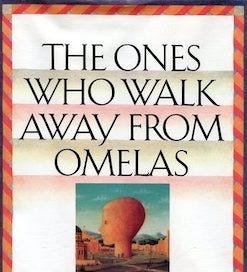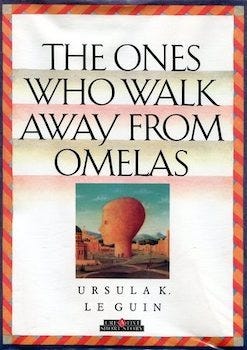Ursula K. Le Guin’s short story, “The Ones Who Walk Away From Omelas” is part philosophy and part political theory. Asking us at once “what if”, and “what will you do”. It’s simply a masterpiece, and I have to thank my friend, an incredible scholar Paige Sweet, for turning me onto it. You can go look up a longer synopsis if you want, but it is a 5 page short story that will consume your thoughts because of how perfectly it is written, and at the same time because of the types of questions it asks of the people of Omelas, and of us. The story is about a fictional perfect society, where everything is wonderful and in harmony and delightful. But all of these delights are contingent on the lifelong suffering of a child, locked away in its own filth and never cared for beyond a basic feeding. The child’s suffering, it is thought, is what holds the serenity of this place together. Without the child’s suffering, the society falls apart.
For long stretches of our lives, most of us continue unrelentingly engaging in the fantasy of ourselves emerging as good actors in impossibly difficult situations. I would argue this, anecdotally of course, in relation to many wildly violent and ugly situations. Would we have stood up against the South African apartheid regime? Of course, most of us would say, secretly harbouring doubt, or perhaps the more cautious among us might argue that “well it was a difficult situation but given the right set of circumstances, I would definitely stand up against the regime in some way”. The classic question will always be about Hitler and the nazis, the question being whether or not we would have had the willingness, the gall, to stand up to an ultimate death violence like that one. Invariably people try to imagine the ways in which they, we, would act under those circumstances.
These questions, these hypotheticals are seemingly unnecessary though. As we continue and continue and continue to see with the explosive, unrelenting, decades long violences against the people of Sudan, of Congo, of Palestine, of Yemen, and so on and so forth. We are asked this question every day. And while I agree with Tamler Sommers and David Pizaro in their Very Bad Wizards episode on Le Guin’s short story, that it would be reductive to simply call it an allegory, we have to contend with the fact that there are some deeply allegorical elements to the short story.
The problem is also that this story is not a thought experiment, but a rewording of a set of contemporary crises, and so how to come to the text figures a particular set of issues as well. The question is always will we walk away from Omelas? Where Omelas are the comforts capitalism provides the capitalist classes and those of us who believe we can attain the wealth of the capitalist classes, where Omelas are the patriarchal structures that entrench bias and discrimination along the lines of a binary manness, where Omelas are structures of race and racism.
And the question builds out further. The ones who walk away from Omelas, after seeing the child suffer to hold their society up, the child living in its own filth and suffering the loneliness and weight required to hold up its society’s comforts, what is the weight of the choice they are making to walk away, and what is the moral and ethical politic behind a move to walk away to a place they don’t know. They don’t know what is out there, but they never return. They leave without knowing what comes next, but they also leave with the knowledge that their Omelas, the one they know, will continue to exist and live on in this way.
The philosophical question here about utilitarianism as opposed to a kind of moral principle like deontology is also a centrally important one. If the greater good requires that one child suffers, while it enables a whole city to live beautifully, is it justifiable to say then that child should suffer? A deontologist would say no, surely not, the act of making the child suffer, the act alone of making suffering for one, even if for the greater good of a whole society can never be okay. But something about this story extends beyond these two philosophical approaches, something about it shakes the foundations of what these approaches can do. Utilitarianism is about the potential good for the majority, regardless of what that good might do to a few here and there. For instance one could argue, according to utilitarian approaches, that if there is enough good done for the vast majority by enslaving a minority of people and it causes a net gain in the joy and wellbeing of the majority, then enslavement is justifiable. On the other hand, deontology would say that regardless of the outcome, doing the morally right thing absolutely is the only way. So even if that morally right course of action causes mass death or undue harm, that course is always the only justifiable action.
“The Ones Who Walk Away From Omelas” asks us if the choice of the ones walking away is a cowardly act, as it avoids making a choice except the choice of possibly personally suffering. It asks us if the ones who walk away are brave for walking away into the unknown after witnessing the child’s suffering. I cannot say whether it is cowardice or bravery to walk away from this perfect society, apart from the fact that it destroys this one individual. Walking away does nothing for the life of the suffering child. That child stays there until it becomes liberated somehow. So the only point of walking away is a placation of the moral discomfort these individuals from Omelas feel.
But what is the correct course of action here? If they liberate the child, their whole society will possibly crumble into destitution and ugliness, with none of the beauty and delight of before, none of the ease and comfort, throwing the lives of all of the city dwellers into strife and suffering. Perhaps, for the suffering one to be liberated, it is okay that everyone too will suffer. Surely they will find a way.
I have no concluding thoughts. I have no right to pass judgment here. I am watching all of us decide daily if we will walk away. Something Cabral has called class suicide, where the bourgeois classes have to consider that to relent to the revolutionary goal of an equitable society, there has to be a relinquishing of certain power structures and landlordship or labour exploitation. This is a massive question that realistically we have to keep confronting if we are for a liberation that brings about lasting wellness for all people. I pass no judgment, but merely ask myself what choice I could make, and what choice I would make?





This passage-- "The problem is also that this story is not a thought experiment, but a rewording of a set of contemporary crises, and so how to come to the text figures a particular set of issues as well. The question is always will we walk away from Omelas?" -- so beautifully articulates the crisis at the core of this short story. Thank you for your thoughtful reflections on how this story shows our inevitable complicity and foregrounds the impossible choice it presents to all of us.